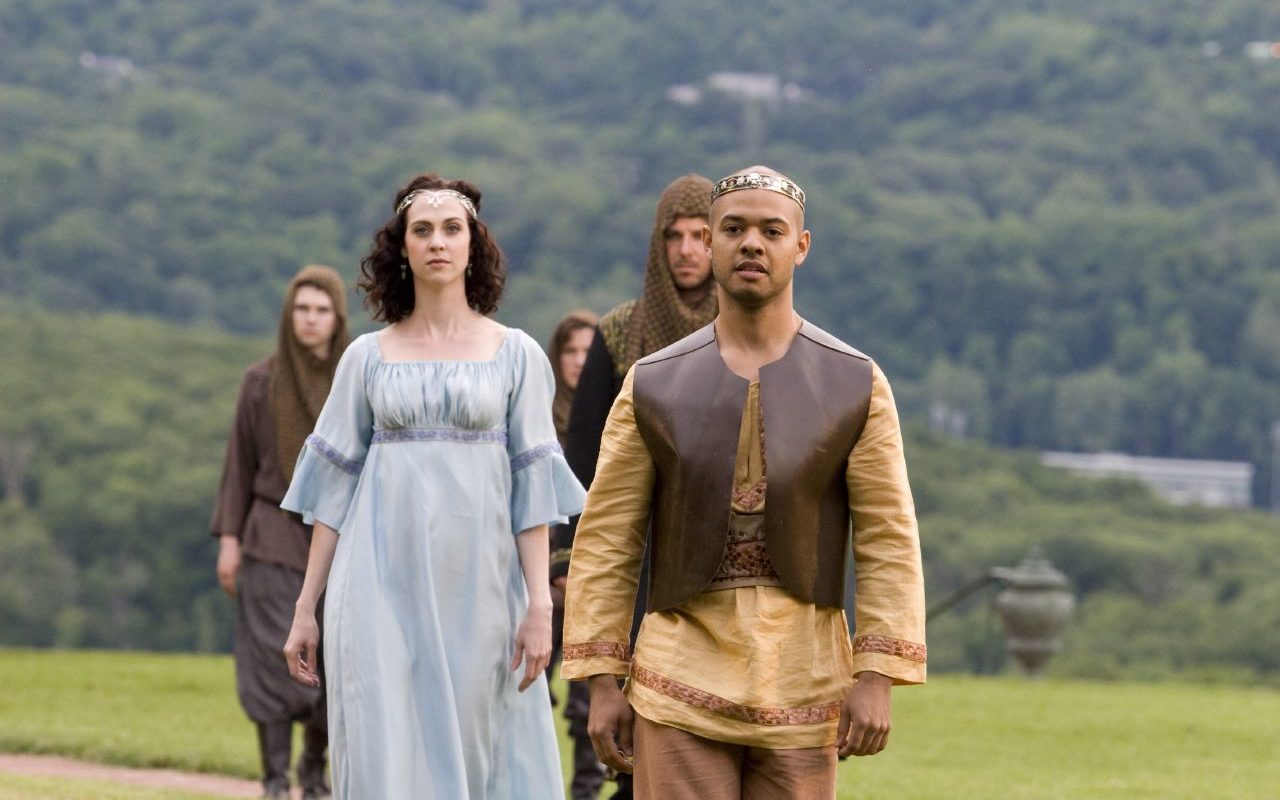Photo by William E. Marsh. Ryan Quinn and the cast of “Pericles” from a 2009 production at Hudson Valley Shakespeare Festival.

Originally published on August 1, 2021 in Chronogram by Brian K. Mahoney
A Q&A with HVSF Veteran Ryan Quinn
“The Tempest,” Shakespeare’s late masterpiece, is a meditation on magic, love, betrayal, and forgiveness—and parenthood, according to Ryan Quinn, who’s directing Hudson Valley Shakespeare Festival’s upcoming production, the final play to be staged at Boscobel, the festival’s home for the past 35 years. HVSF will be moving a few miles down the road to the former Garrison golf course, a 98-acre property donated by philanthropist Christopher Davis which will become its permanent home.
In early July, I spoke with HVSF veteran Ryan Quinn about how he’s thinking about the staging of “The Tempest,” which will run at Boscobel August 5 through September 4.
—Brian K. Mahoney
Brian K. Mahoney: Where is the emotional heart of “The Tempest” for you?
Ryan Quinn: I have a five-year-old, a little girl named Zoe. Reading the play this time, now being a dad and 15 years removed from the last time that I did it, the play sits differently in me. The main point of contact is the relationship between this father and a daughter, and the 12 years they’ve spent together. Prospero has had to raise Miranda on this island and this idea that a lot of times when you have kids, you’re really raising them up to let them go—and how heartbreaking that is. One of the first things Prospero says to Miranda is: “I’ve done everything in care of thee.”
Everything is for you, but then three scenes later, as she’s about to get with Ferdinand—and I’m paraphrasing—Prospero’s like, “Stay in your place. Don’t get in the way, you don’t know what you’re doing. If you keep yelling at me like this, it’s going to make me chide you if not hate you.” How both those things can live in one man. There’s a lot of that in parenthood when we get in the way of our own intentions. That manifests itself throughout the play. It’s the person that Prospero’s trying to be in the world being faced up against the people who have betrayed him. It’s Prospero wanting to give away his magic and release the service of Ariel, but being confronted with the fact that he actually has to do it. It’s “finding a rare action in virtue,” as Prospero says, despite how much you want to hold on to your power and your rage and your anger.
The etymology of the word tempest actually goes back to the word “time.” The play could be called “The Time,” like the amount of time that Prospero has to get the storm done. But it’s also the amount of time that it takes to heal before he can forgive; the amount of time that you get with your daughter before you have to let her go; the amount of time that those people are in servitude; or for us, the amount of time that we’ve all been in quarantine and now we’re going to be back in the theater.
In all of our minds and in everything that we do, it’s tough not to see metaphors for lockdown. Does this carry over into this production of “The Tempest”?
RQ: It can’t not be part of the fabric of everything that’s going on. At the end of the day, “The Tempest” is about these two people coming back out of isolation and back into society—that’s really at the heart of this, it’s inescapable. And we really don’t have to lean into it too much for it to be very present.
How do you view Caliban’s role in the play?
RQ: It’s a beautiful, tricky one, and I think we’re figuring out what it means in our production. Race is also often involved in the casting of this play and is often looked at as like an allegory for colonialism. In our cast, our Prospero is Black [Howard Overshown] and our Caliban is Jason [O’Connell, an HVSF veteran and a white actor]. We’re renegotiating what that power dynamic is and that structure is about. And we get to see in this model just how power and rules manifest. And I think that’s one of the reasons that Caliban wants to get Prospero’s books. It’s the ability to control narrative. The narrative is the magic.
The play is set on a deserted island. There’s also minimal staging in the tent at HVSF. As a director, do you find the stripped-down setting limiting or freeing?
RQ: This isn’t the answer you want, but both. I love it. Why I love being an actor here is that our main relationship is between the actor and the audience. The language has to tell the story because we don’t have all the other bells and whistles.
And doing that makes us have to be super, super specific about what it is that we’re doing. We can’t be saved by telling the picture with the set. We have to do it with the language. It really allows the audience in, in a different way. In the end, I do think it’s completely freeing, but at the very top, I think it’s a little bit harder. It’s about holding space for those moments of grace where you don’t know what’s going to happen, and all of a sudden, that space fills with something beautiful.

